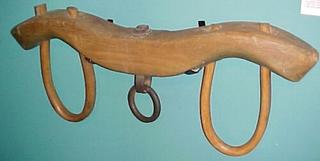The goal of Biblical exegesis is to explore the meaning of the text which then leads to discovering its significance or relevance. Applying exegesis should make our reflection on the readings of the Sunday Liturgy more fruitful and helpful.
Tuesday, June 28, 2005
Monday, June 27, 2005
14th Sunday in Ordinary Time
FOR MY YOKE IS EASY AND MY BURDEN IS LIGHT.

MY YOKE IS EASY.
The Jews use the phrase 'the yoke of the Torah and the yoke of the Kingdom' to mean submission to the Torah and to the Kingdom. Here it refers to the interpretation of Jesus of the law.
In comparison to the the interpretation of the Pharisees, the teaching of Jesus is quantitatively easier because it is shorter and centered on the essential. However, because of the righteousness demanded in 5:20 (I tell you, unless your righteousness surpasses that of the scribes and Pharisees, you will not enter into the kingdom of heaven.), it is qualitatively more difficult.
I would like to imagine that the yoke of Jesus is easy because the yoke he is talking about is a double yoke, that is, it is for two oxen. It is easier to pull a load when two are working at it. Hence, it is also easier to meet the demands of Jesus because he is helping us meet those demands. He himself said in 5:48 "You must be made perfect as your heavenly Father is perfect." It is not me who makes myself perfect. Yes, I must cooperate with God. But still it is the grace of God working in me.
The Greek word used for 'easy' is 'chrestos'. But it can also be translated as 'well-fitting'. It means that yoke was tailor-made to fit the ox. It would be consoling to think that whatever God sends me in this life is something that I can handle. When Paul complained to the Lord about his illness and asked him to take it away, the Lord told him: "My grace is enough for you." Writing to the Corinthians, he assured them that he "will not allow you to be tested beyond your strength." Indeed, "God will not lead you where his grace cannot keep you."
MY BURDEN IS LIGHT.
In 1941, Father Flanagan was looking at a magazine called The Messenger when he came across a drawing of a boy carrying a younger boy on his back, with the caption, "He ain't heavy Mr., he's my brother." Father Flanagan thought the image and phrase captured the spirit of Boys Town, so he got permission and commissioned a statue of the drawing with the inscription, "He ain't heavy Father, he's my brother."
The Two Brothers concept precedes the magazine illustration that Father Flanagan saw. In 1921, there was a resident at Boys Town who had difficulty walking. He wore leg braces and the other boys would often take turns giving him a ride on their backs. There is a famous photograph of this boy and one of the other youth giving him a ride.
There is another version of the story. One day a man saw a small boy carrying a still smaller boy on his back. The smaller boy was lame. As the they passed by, the man commented to the small boy, "That's a heavy burden for you to carry." The small boy answered, "He's no burden, Mister. He's my little brother."
The point is not that the burden is easy to carry. The point is that love makes the heaviest burdens light.
Saturday, June 25, 2005
Friday, June 24, 2005
13th Sunday in Ordinary Time
INTRODUCTION: FAMILY FIRST
There is a company with the name: Family First. It is because of family first that many Filipinos go abroad and work. But if we put God into the picture, then Family First must give way to God First.
When the scribes and Pharisees asked, “Which is the greatest commandment.” Jesus responded, “You shall love the Lord your God with all your heart, with all your mind and with all your strength. The second is like it. You shall love your neighbor as yourself.”
God is to be loved over and above everyone and everything else. God first. When God tells Israel in the Old Testament that he is a jealous God, he is telling them that he permits no rival. He and he alone must occupy the first place.
Thomas More was a man who gave God first place over King Henry VIII of England and in so doing lost his life on earth but found it again in heaven. The king with the support of the majority of Bishops of England petitioned the Pope to allow him to divorce Queen Katherine of Aragon. The Pope replied with “what God has joined together, let no man put asunder.” The king broke away from Rome and established the Anglican church. With the blessing of the Anglican church, he divorced Queen Katherine and married Anne Boleyn. In April 1534, More refused to swear to the Act of Succession and the Oath of Supremacy. The Oath of Supremacy recognized Henry the VIII as head of the Church of England. For that he was charged with treason and imprisoned at the Tower of London. He was beheaded on July 6, 1535. At the scaffold, he declared: “I am the King’s good servant. But God’s first.”
We often think of idolatry as worshipping idols. And being modern and educated, we would think that adoring graven images as if they were gods is something that happens only among the ignorant and superstitious.
But idolatry can take on subtle forms. For instance, to allow someone or something to take precedence over God is a form of idolatry.
Not to go to Mass on Sunday because of laziness is a form of idolatry. I become the idol because I put my laziness ahead of God. I grab the first place from God.
Corruption is a form of idolatry. I put money in the first place. I refuse to listen to God who tells me to be honest.
Not giving time to prayer is a form a idolatry, too. Other people and other things become more important than God so much so that I no longer have time for God. God is no longer first.
GOD FIRST
Thomas More was a man who gave God first place over King Henry VIII of England and in so doing lost his life on earth but found it again in heaven. The king with the support of the majority of Bishops of England petitioned the Pope to allow him to divorce Queen Katherine of Aragon. The Pope replied with “what God has joined together, let no man put asunder.” The king broke away from Rome and established the Anglican church. With the blessing of the Anglican church, he divorced Queen Katherine and married Anne Boleyn. In April 1534, More refused to swear to the Act of Succession and the Oath of Supremacy. The Oath of Supremacy recognized Henry the VIII as head of the Church of England. For that he was charged with treason and imprisoned at the Tower of London. He was beheaded on July 6, 1535. At the scaffold, he declared: “I am the King’s good servant. But God’s first.”
JESUS FIRST
When Jesus told his disciples that he, Jesus, takes precedence over mother, father, son or daughter, even over their very self, he in fact is declaring himself to be God. Consequently, when choices have to be made, the choice will have to be Jesus Christ.
Polycarp was a disciple of the Apostle John and an early church leader whose life ended when he refused to betray Jesus Christ. Asked one last time to reject his Christ, the old man replied, “Eighty and six years have I served Him, and He has done me no wrong. How can I speak evil of my King who saved me?”
For choosing Jesus, he was burned alive.
For choosing Jesus, he was burned alive.
IDOLATRY
But idolatry can take on subtle forms. For instance, to allow someone or something to take precedence over God is a form of idolatry.
Not to go to Mass on Sunday because of laziness is a form of idolatry. I become the idol because I put my laziness ahead of God. I grab the first place from God.
Corruption is a form of idolatry. I put money in the first place. I refuse to listen to God who tells me to be honest.
Not giving time to prayer is a form a idolatry, too. Other people and other things become more important than God so much so that I no longer have time for God. God is no longer first.
CONCLUSION
"I am a Christian, and this I profess until the hour of my death and for God I shall give my life. Although I did not come to Japan to be a martyr, nevertheless as a Christian and for God I shall give my life." St. Lorenzo Ruiz.
Perhaps none of us will ever be called to die for Jesus Christ. But as John Paul II said when he canonized Lorenzo Ruiz: “The call to die for the faith is a call for some. But the call to live the faith is a call for all.” May our lives always show that God occupies the first place in our lives.
Sunday, June 19, 2005
Wednesday, June 15, 2005
12th Sunday in Ordinary Time
YOU ARE WORTH MORE THAN MANY SPARROWS
HAVE NO FEAR OF THEM
We all experience fear.When we were at the Universal Studios, we were at that point of the tour where sound effects were recorded and synchronized with a movie. The emcees asked for volunteers. Many hands were raised. I thought to myself: "If we were in the Philippines, you would be lucky to see 5 hands raised." Why this? We are either shy or afraid. We are afraid of making a fool of ourselves. We are afraid of not performing good enough.
When I was a Catechist, I used to bring the boys to Batulao for their retreat. I would sleep near the door so that in case someone needed to go to the CR at night but was afraid, he could wake me up.
I read of a US soldier who was stationed in Korea during the Vietnam war. He was afraid that he might be shipped out there. So he fled to North Korea.
More tragic was the case of a young man who hanged himself because he was afraid his father might get to know about the overseas phone bills he accumulated at his uncle's office because of phone sex.
The effects of fearIn the face of a perceived threat, our natural emotional reponse is fear. Fear makes us pause. It enables us to examine the situation and decide whether to flee or fight. The goal is self-preservation.
When I was still studying theology at UST, I saw a college student running as fast as his feet could carry him. There was fear written all over his face. He was probably running away from someone who was out to hurt him.
But fleeing does not have to mean running away. It could also mean hiding. Last time I heard, Atty. Ong is in hiding.
Dealing with fearSometimes we are the ones who scare ourselves. Some of us refuse to speak in public. Why? Because we tell ourselves that we might say something wrong and get embarrassed. The solution is to silence the negative dialog that goes on in our heads.
Another strategy is to ask ourselves: "What is the worst thing that can happen?" The answer might be something that we can live with. For example, I am afraid of praying before meals when I eat lunch with my colleagues. I ask myself: "What is the worst thing that can happen?" Answer: "They might remark that I am being too holy." Question: "Can I live with that?" Answer: "Yes."
Another strategy is to look at fear straight in the eye. I admit that I am afraid of the needle. Before I would turn away when the nurse would insert the needle to get blood for testing. Then one day I decided to look at fear straight in the eye. I forced myself not to turn away. I looked as the nurse inserted the needle into my vein.
The best strategy, however, is to have faith in God. Jesus tells us today: "Are not two sparrows sold for a small coin? Yet not one of them falls to the ground without your Father's knowledge. Even all the hairs of your head are counted. So do not be afraid; you are worth more than many sparrows."
When St. Dominic Savio was a small boy he used to walk to school alone. A farmer who often see him trudge the road many time asked him one day: "Aren't you afraid to walk alone." And Dominic answered: "No. I have my guardian angel with me." Even at such a young age, Dominic believed in a God who was so concerned about his safety that he gave him a guardian angel to watch over him.
ConclusionMany people have the mistaken notion that brave people are those who do not feel afraid. If you ask them you will be surprised to discover that they too experience fear. But what they do is to act in spite of their fears.
For those who believe that God is good to them, that is enough to act in spite of their fears.
Monday, June 13, 2005
Saturday, June 11, 2005
11 Sunday in Ordinary Time
PROMOTING VOCATIONS TO THE PRIESTHOOD

Some have observed that perhaps this entails some out-of-the-box thinking. If there are few entering the priesthood, why not look to lay people who are willing to share their time, talent and treasure in the apostolate? This is an authentic option because responsibility for the growth of the Kingdom belongs to the Church and the Church is not only priests but lay people, as well. Nevertheless, the ministerial priesthood is indispensable for the life of the God's people. And so work for vocations to the priesthood should continue in earnest.
The obstacles to vocation promotion are many. Parents often stand in the way of their children who have made up their mind to say "Yes" to the Lord. Extended adolescence have made it difficult for young people to make a commitment. The many options facing them have aggravated the situation. Some have expressed the feeling that they are not good enough or not intelligent enough to enter the seminary.
Those who work directly for vocation promotion also have their own "demons" to grapple with--the demons of frustration and discouragement. After so much effort, only a few enter the seminary. At times, none at all. The temptation is to throw in the towel and say: "What's the use!"
In reality vocation promoters do not really plant the seed of vocation. It is God. That is perhaps why Jesus tells us to pray to God for vocations. The task of vocation promoters is to help young people become aware of the seed and help them to take steps to nurture that seed.
What can be the involvement of lay people in vocation promotion? They can encourage young people to say "Yes" to God's call. They can also provide financial support to pay for the studies and board and lodging of the seminarian. Finally, because families are the seed bed of vocations, they can provide a healthy family environment and a lived experience of Christian life in which the seed of vocation can grow and flourish.
Someone said that a vocation is a daily answer of yes to a daily call from God. This means that taking care of one's vocation doesn't stop when one is ordained a priest. It continues until death. For the gift of the priesthood can be lost. For the priest this entails prudence and a fervent spiritual life. For the lay people it means appreciation for their priest, being forgiving of his defects and assurance of their support.
St. John Bosco said with great conviction: "The greatest gift that God can give to a family is a son priest." If this is so, then having a priest in the family is a sign of God's special affection for that family.

THE HARVEST IS ABUNDANT BUT THE LABORERS ARE FEW.Perhaps the number of laborers in the Lord's harvest will never be enough. Still the need is great and every effort should be made to work for vocations to the apostolic life.
Some have observed that perhaps this entails some out-of-the-box thinking. If there are few entering the priesthood, why not look to lay people who are willing to share their time, talent and treasure in the apostolate? This is an authentic option because responsibility for the growth of the Kingdom belongs to the Church and the Church is not only priests but lay people, as well. Nevertheless, the ministerial priesthood is indispensable for the life of the God's people. And so work for vocations to the priesthood should continue in earnest.
The obstacles to vocation promotion are many. Parents often stand in the way of their children who have made up their mind to say "Yes" to the Lord. Extended adolescence have made it difficult for young people to make a commitment. The many options facing them have aggravated the situation. Some have expressed the feeling that they are not good enough or not intelligent enough to enter the seminary.
Those who work directly for vocation promotion also have their own "demons" to grapple with--the demons of frustration and discouragement. After so much effort, only a few enter the seminary. At times, none at all. The temptation is to throw in the towel and say: "What's the use!"
In reality vocation promoters do not really plant the seed of vocation. It is God. That is perhaps why Jesus tells us to pray to God for vocations. The task of vocation promoters is to help young people become aware of the seed and help them to take steps to nurture that seed.
What can be the involvement of lay people in vocation promotion? They can encourage young people to say "Yes" to God's call. They can also provide financial support to pay for the studies and board and lodging of the seminarian. Finally, because families are the seed bed of vocations, they can provide a healthy family environment and a lived experience of Christian life in which the seed of vocation can grow and flourish.
Someone said that a vocation is a daily answer of yes to a daily call from God. This means that taking care of one's vocation doesn't stop when one is ordained a priest. It continues until death. For the gift of the priesthood can be lost. For the priest this entails prudence and a fervent spiritual life. For the lay people it means appreciation for their priest, being forgiving of his defects and assurance of their support.
St. John Bosco said with great conviction: "The greatest gift that God can give to a family is a son priest." If this is so, then having a priest in the family is a sign of God's special affection for that family.
Tuesday, June 07, 2005
Thursday, June 02, 2005
Inspiration
10th Sunday in Ordinary Time
Calling of Matthew

Levi is probably his original name. Matthew was the name given to him by Jesus at the time of his calling.
As a tax collector or publican in Capernaum, he was collecting custom duties for Herod Antipas. Like Zacchaeus, he was probably hated because of corruption and collaboration with the Roman occupation.
We do not have any certainty about his field of evangelization, although most mention Ethiopia south of the Caspian Sea (and not the Ethiopia in Africa).
Ancient testimony points to his martyrdom but there is no agreement as to how he died. Some say he was burned; others, beheaded and still others, stoned.

Who was Matthew?He was an Apostle and an Evangelist. As an Apostle, he was one of the Twelve chosen by Jesus Christ to be his closest collaborator. As an Evangelist, he wrote the Gospel for the Hebrews. His is one of the four Gospels--the others being Mark, Luke and John.
Levi is probably his original name. Matthew was the name given to him by Jesus at the time of his calling.
As a tax collector or publican in Capernaum, he was collecting custom duties for Herod Antipas. Like Zacchaeus, he was probably hated because of corruption and collaboration with the Roman occupation.
We do not have any certainty about his field of evangelization, although most mention Ethiopia south of the Caspian Sea (and not the Ethiopia in Africa).
Ancient testimony points to his martyrdom but there is no agreement as to how he died. Some say he was burned; others, beheaded and still others, stoned.
Follow meIf someone were to say, "Follow me" I could interpret his invitation in three ways:
- Go to where he is going.
- Do as he does. Imitate him.
- Be his disciple (taga-sunod)
- Is he inviting me to go where he is now--heaven? In other words, is he telling me to keep my eyes fixed not only down but up as well? Is he inviting me to take care not only of my body but also of my soul? Is he not inviting me to raise my mind and heart in prayer to him who is now in heaven?
- Or is he inviting me to imitate him? In other words, is he not asking me to examine myself and see where I have failed to be Christ-like? Is Jesus not inviting me to conversion? I am called a Christian because I am a follower of Christ. This means that I follow a certain way of life. This is probably the reason why Christians were said to follow The Way (see Acts).
- Or is Jesus not inviting me to discipleship? In other words, is Jesus not inviting me to service in the kingdom?
- From a collaborator of the Romans to a collaborator of God.
- From the business of collecting money to the business of "collecting" souls.
- From being an employee of Herod to an apostle of Jesus Christ.
- From a secure and familiar life to one that is uncertain, a leap in the dark
Subscribe to:
Comments (Atom)







